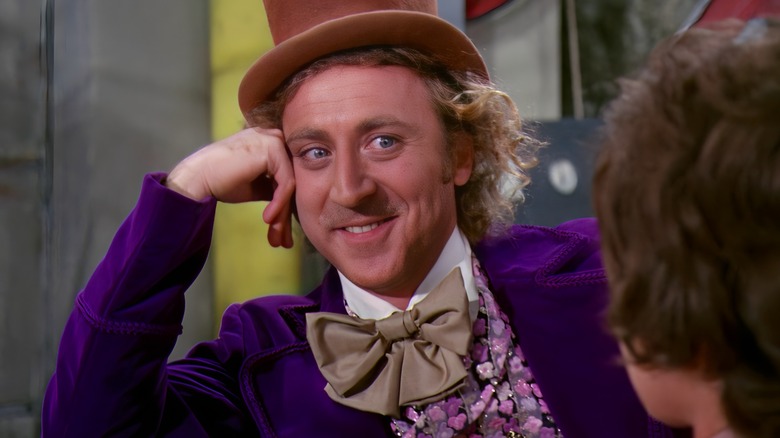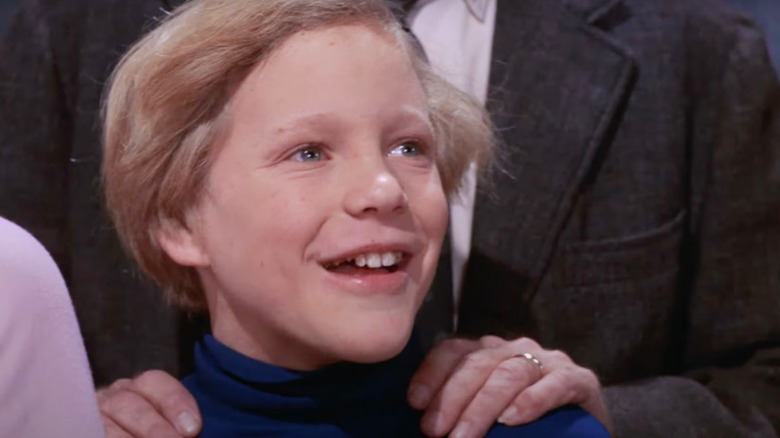Willy Wonka Theory Might Change Everything You Thought About Charlie's Prize
1971's "Willy Wonka & the Chocolate Factory," and by extension the 2005 remake, seems like a whimsical adventure when you watch it as a child. A group tours a candy factory operated by the larger-than-life Willy Wonka (Gene Wilder). The bad children are punished, while noble Charlie (Peter Ostrum) is rewarded with owning the business, and he gets to live in it with his family, seemingly ending their financial hardships once and for all. But while it appears like a happy ending, one startling fan theory suggests it's anything but.
Redditor u/MasterLawlz posits that Willy Wonka punishes every other child; it makes sense he would save the worst punishment of all for Charlie. They declare, "Owning and running the chocolate factory was not a positive experience for Wonka. It took a very obvious toll on his mental health and made him basically unable to interact with other people. The trials he laid out were to see if the potential kids could take care of the factory." The other kids were naughty and, thereby, unfit to run the company. For example, Augustus Gloop (Michael Böllner) eats and contaminates the product, and Violet Beauregarde (Denise Nickerson) doesn't follow instructions.
If Willy Wonka gave the factory to any of the others, they'd surely run it into the ground. But Charlie's different, as u/MasterLawlz continues, "Charlie was the only one just gullible enough and innocent enough to take care of the factory and follow the rules forever, and Wonka saw that he was the only one suitable to push this hellish existence on. He'll be fine in the near future when his family is alive but when they're all eventually gone then he'll likely realize Wonka's factory was never a reward at all."
Roald Dahl was known for dark stories anyway
It's a rather dark fan theory, suggesting Charlie will go mad like Willy Wonka. Of course, there's ample evidence from the text to suggest it's literally meant to be a happy ending with Willy Wonka only having good intentions, which is further exemplified in the book sequel, "Charlie and the Great Glass Elevator." Still, it's amusing to consider whether there's more than meets the eye in the classic children's story.
Some Redditors tried to poke holes in the theory by suggesting Charlie could simply sell the factory, like u/flamingos_world_tour: "Yeah but the brand is world famous apparently so he could just sell it to Kraft for billions and move to the Bahamas." But another Redditor pointed out, "Well, he's actually passionate about his product, his job, and the quality of his work, and he clearly sees that in Charlie." With this reasoning, it's possible Willy Wonka didn't want to dismantle his factory completely. He wants his legacy to remain intact, so he needs the wonderment of a child who understands how important it is and isn't going to sell it at the first opportunity. This is seen in the movie when Charlie returns the Everlasting Gobstopper, showing how he values Willy Wonka's products more than making a quick buck.
Plus, any nihilistic undertones would feel right at home within author Roald Dahl's other works. After all, Dahl had a story called "The Swan," where a boy watches some bullies shoot a swan dead, and then the bullies remove the wings and tie them to the boy. It's dark stuff for a children's story, and a more pessimistic interpretation of "Willy Wonka & the Chocolate Factory" could point to Charlie getting taken advantage of due to his youthful naivety.
Despite any evidence, don't expect the prequel "Wonka" to portray the titular character as such a sociopath.

